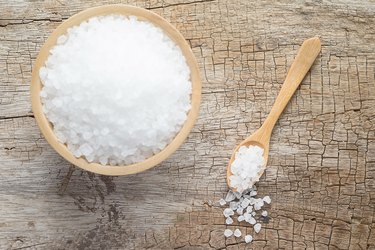
There are many drinks and foods that increase the heart rate. You may even experience heart palpitations and other cardiac symptoms after consuming these products. In most cases, such side effects will pass quickly, but you may want to be cautious about consuming large amounts of these products.
Tip
Quite a few foods can increase your heart rate, especially if you consume them in excessive amounts. Foods that increase heart rate include chocolate, caffeinated products and monosodium glutamate.
Video of the Day
Cardiac Health and Diet
According to the Mayo Clinic, a normal resting heart rate ranges between 60 and 100 beats per minute. However, a healthy heart rate can also be much lower. For example, a healthy athlete might have a heart rate closer to 40 beats per minute.
Video of the Day
Heart rate can vary depending on factors like age, cardiovascular health, mental state, fitness, body size and any medications taken. Even external factors, like air temperature, can influence your heart rate.
The foods and drinks you consume can also influence your cardiovascular health. Harvard Health Publishing says that too much caffeine, chocolate and alcohol are all potential causes of palpitations. The Mayo Clinic also refers to MSG (monosodium glutamate) as a potential cause of heart palpitations.
The foods that cause heart palpitations are often the same foods that increase heart rate. When your heart rate increases too much, it's known as tachycardia.
Tachycardia can be normal, but in other cases, it can cause a variety of issues. These include problems like dizziness, chest pain or tightness, shortness of breath, fatigue and fainting. If you're regularly experiencing tachycardia, your doctor may ask you to make dietary or lifestyle changes to help reduce your symptoms.
Beverages That Increase Heart Rate
According to an October 2014 study in the journal Trends in Endocrinology and Metabolism, foods and beverages containing caffeine have the potential to cause a wide range of side effects. Whether it's coffee, tea, energy drinks or other caffeinated products, all of these beverages have the potential to increase heart rate. They might also cause other side effects, such as headache, nausea and anxiety.
That being said, moderate caffeine intake (which is about 400 milligrams per day) isn't usually associated with such side effects. In fact, according to a September 2013 study in the Journal of the American College of Cardiology, around two to three cups of coffee per day is considered healthy — and potentially even beneficial.
The Trends in Endocrinology and Metabolism study reported that the following amounts of caffeine could be found in 8-ounce servings of these commonly consumed beverages:
- Drip coffee: 95 to 330 milligrams
- Instant coffee: 30 to 70 milligrams
- Black tea: 40 to 74 milligrams
- Green tea: 25 to 50 milligrams
- Oolong tea: 21 to 64 milligrams
- Yerba mate: 65 to 130 milligrams
- Energy drinks: 33 to 400 milligrams
This variability among products means that just two cups of drip coffee could exceed your recommended daily caffeine intake, while more than five cups of tea is still likely to be within a moderate range.
However, it also means that people who experience cardiovascular side effects after consuming caffeine may not need to eliminate caffeinated products from their diets. The solution might simply be to try consuming a different product, like instant coffee instead of drip coffee.
Foods That Increase Heart Rate
Although chocolate may be associated with beverages and desserts, it also contains caffeine. In small amounts, chocolate can help modulate the immune and cardiovascular systems. Typically, its effects on heart health are only positive, because it contains a variety of beneficial antioxidants.
However, according to a January 2018 review in the journal Frontiers in Bioscience, too much chocolate can result in cardiovascular issues. These cardiovascular problems come from the caffeine content in the cacao bean, so the likelihood of you experiencing any side effects will be based on both the amount and type of chocolate you've consumed. Chocolate has been known to cause issues like tachycardia, palpitations, atrial fibrillation and tachyarrhythmias (abnormal, rapid heart rate).
The Trends in Endocrinology and Metabolism study reported that many people are often sensitive to other commonly used ingredients in caffeinated products. These ingredients, including taurine, glucuronolactone, ginseng and Ginkgo biloba, are also likely to cause increased blood pressure or tachycardia after you eat or drink them. Many of these added ingredients are like chocolate and contain caffeine.
MSG, an ingredient used to enhance the flavor of savory foods, does not contain caffeine. However, as with caffeinated products, you may experience heart palpitations and tachycardia after eating it.
This ingredient has been reported to cause side effects like headache, flushing, sweating, chest pain, nausea and weakness. MSG consumption may also result in numbness, tingling, pressure or burning feelings around your head and neck. However, not everyone experiences these symptoms. If you do feel this way after eating foods with MSG in them, you should probably avoid consuming this additive.
Nutrients Involved in Cardiovascular Health
Many of the foods you consume help support your cardiovascular health. These foods contain essential nutrients that can help regulate your blood pressure, maintain normal heart rhythm and support other aspects of healthy heart function.
According to the Food and Drug Administration, foods with potassium and magnesium are beneficial to your cardiovascular health. Both of these essential nutrients regulate blood pressure and maintain normal heart function. Sodium and vitamin D can also influence your blood pressure.
Sodium, in particular, is a nutrient to watch out for. According to the American Heart Association, most people consume too much sodium each day. Instead of consuming the recommended 1,500 to 2,300 milligrams per day, the average American consumes 3,400 milligrams of sodium on a daily basis.
Excessive sodium consumption is widely known to increase your blood pressure and be bad for your cardiovascular health. In turn, reducing your sodium intake lowers your blood pressure. However, according to a March 2016 study in the journal Frontiers in Physiology, lowering your sodium consumption also increases your heart rate.
You should talk to your doctor or nutritionist before making any major dietary changes like drastically reducing your sodium intake. While an increase in heart rate may be a nonissue for healthy people, it can be dangerous for people who have pre-existing cardiovascular issues.
- Mayo Clinic: "What's a Normal Resting Heart Rate?"
- Harvard Health Publishing: "Skipping a Beat — the Surprise of Heart Palpitations"
- American Heart Association: "Tachycardia: Fast Heart Rate"
- Trends in Endocrinology and Metabolism: "Impact of Caffeine and Coffee on Our Health."
- Journal of the American College of Cardiology: "Effects of Habitual Coffee Consumption on Cardiometabolic Disease, Cardiovascular Health, and All-Cause Mortality"
- Frontiers in Bioscience: "Impact of Chocolate on the Cardiovascular Health."
- Mayo Clinic: "What Is MSG? Is It Bad for You?"
- American Heart Association: "How Much Sodium Should I Eat per Day?"
- Frontiers in Physiology: "Reduced Dietary Sodium Intake Increases Heart Rate. a Meta-Analysis of 63 Randomized Controlled Trials Including 72 Study Populations"


